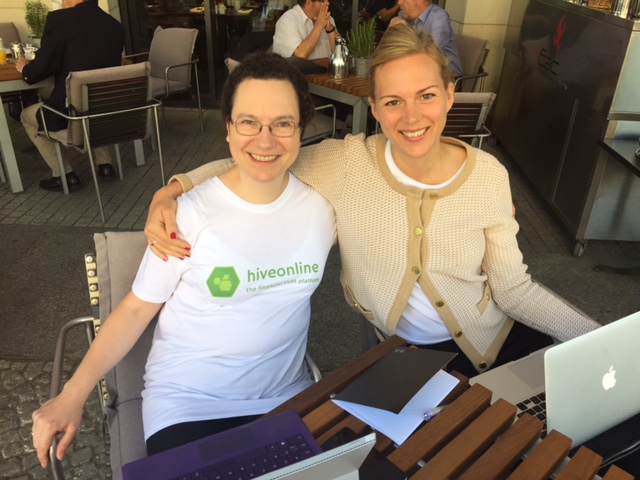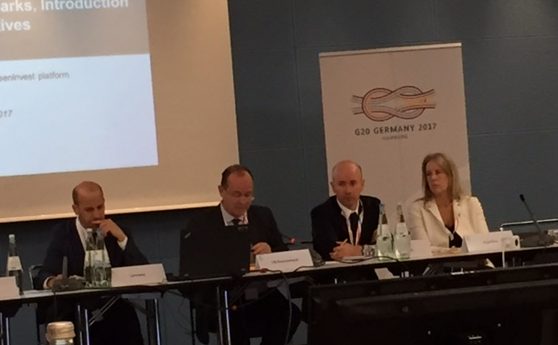Continuing our supporting partnership with UNEP and the Green Digital Finance Alliance, the Stockholm Green Digital Finance centre and hiveonline were invited to Berlin to advise the G20 policymakers and representatives of the V20 countries – 46 countries made particularly vulnerable by climate change – on how fintech could help them. The 30-31 May G20 meeting’s focus was on how fintech can support developing economies, and the emerging green fintech scene was also represented alongside policymakers from representative countries.
Given the audience, this was an interesting challenge. Recent experience from the G7 meeting in Venice showed us that policymakers are largely unaware of the potential benefits offered by Fintech, seeing it as something of a technology trend but not relevant to them. We were invited to participate in Venice following some visionary research done by the Inquiry into Sustainable Finance, where Simon Zadek and others have identified many potential applications for fintech in achieving the 2030 Sustainable Development Goals, but communicating the opportunities and bringing them to life is challenging for an audience absorbed in long-running debates.
Fintech – why’s it relevant to the green agenda?
Simon and his team had planned for this and arranged an agenda designed to both challenge perceptions and include policymakers in active participation in solution making. After a warm welcome from the German Federal Ministry for Economic Cooperation and Development, we heard from a number of speakers giving a broad outline of the challenge we face, and painting a compelling picture of the scale and urgency of the problem. Discussions included the challenge of investment in green programmes, the challenge of defining what is green and the role of the G20 in managing through a period of financial transformation.
Solutions for a greener future
hiveonline was then invited to present alongside Ant Financial, SolarCoin, Mobisol and UN Women. Ant Financial are running a fascinating green behaviour rewards scheme, using gamification to encourage consumers, with an impressive 200m+ subscribers. This was a great segue into discussing the broader applications of reputation systems like hiveonline in empowering communities towards sustainability, by reducing investment barriers, credit barriers, community barriers and inclusion barriers. Nick Gogerty of Solarcoin built on this to talk about alternative financial instruments and tokenisation, the opportunity presented by encapsulated marketplace services (“small is the new big”) and how blockchain technologies can support marketplaces and trade, reducing emissions through carbon trading and tokenisation of renewable energy.
This panel led to a lively discussion and we were able to further elucidate some points, including that the scale and volatility issues associated with Bitcoin only apply to certain types of digital currency, whereas others are underpinned by assets, fiat currency or global indexes, while also highlighting the potential benefits for global capital markets, of transparency, reduced manual intervention, reduced transaction costs and opportunities for removing currency volatility through the use of tokenised assets. Some other key misconceptions about the need for internet connectivity to run fintech, the need for supporting banks and the reliance on a grid were also put to rest!
We heard the importance of fintech and inclusion for women, who are significantly over-represented in the 2 billion unbanked and 1.5 billion lacking formal identity, and how with alternative reputation systems and behavioural credit scoring, women can not only become key participants in the economy but also drive sustainable and community focused behaviours in their countries.
Managing adoption barriers in different economic cultures
A workshop to explore potential applications of fintech to real world challenges was a really useful way of helping participants understand the opportunities of fintech, while helping us fintech people understand the problems we’re trying to solve. I was on a team with participants from Argentina, where 30% inflation presents a challenge, Mongolia, which has very low technology penetration, as well as India, China and Egypt, where digital finance behaviour has already evolved rapidly, and we explored the opportunities offered by a digital currency / digital wallet system for countries with economic challenges and barriers to adoption. We’ll pick up on the outputs of this workshop in a future update, as there were many potential solutions identified.
Launching Stockholm Green Digital Finance
The next panel, on international cooperation and overcoming barriers, discussed how micro-equity and SME exchanges can broaden the investor base for SMEs and Cecilia Repinski, newly appointed Director of the Stockholm Green Digital Finance Centre, after formally launching the Centre and our partnership with UNEP and the Green Digital Finance Alliance, was able to put straight some misconceptions about “fintech for fintech’s sake” while explaining the ambitious programme for Sweden in both education about opportunities for fintech use and execution of pilot projects, supported by hiveonline’s technology.
Green Foreign Direct Investments
We were privileged to be joined by many key figures from the V20 – the group of countries made particularly vulnerable by climate change, and on the second day we focused on the challenge of green Foreign Direct Investment (FDI)s, and heard fascinating and compelling evidence from countries facing different challenges – Thailand, where zoning has been tried but faces challenges, Mongolia, where a large part of the economy is inherently Brown because of their reliance on mining, and efforts are being made to offset with sustainable community projects, Egypt and Ecuador, where attracting any investment in initiatives is a challenge, resulting in a massive shortfall across the board.
Challenges identified were different from country to country – FDIs are overwhelmingly skewed towards Asia, so Latin American and African countries are missing out, while corruption, bureaucracy and political favouritism were common themes. Countries are at different levels of development, with different industries and different investment challenges, but across all representatives there were positive examples of governments actively driving policies to improve things. The hard questions remained, of how to identify and measure green initiatives, and whether to insist on global standards.
Externalities and internalities
The 17 Strategic Development Goals identified after Paris 2015 are a good starting point for any measurement system, and are commonly used today, but imposing a single set of benchmarks across all countries and industries would be setting the bar too high for some, and too low for others. Some commonalities remain – Pindar Wong, of VeriFi, pointed out that externalities – the outputs of polluting activities – are borderless and equally destructive wherever they come from. However, there may be an opportunity to configure benchmarking of internalities within individual countries, industries and even regions/municipalities, to support a tailored set of goals which can be tracked and measured for the investments they cover. These could be matched with the goals typical to large investors, to ensure a strong flow of capital towards these projects.
A measurement system for green investment?
Although the NGO and government community has been struggling with how to define green investment for over two decades, one of the key conclusions of the meeting was that we may now be in a position to exploit financial technology to support a more complex, but more transparent evaluation and measurement system, suitable to a wide range of countries with differing needs and priorities. Although the ultimate goal must be to accelerate all countries towards a common approach to sustainability, such a measurement system could support attracting investment towards that state, especially in countries where investment is currently hard to attract, without compromising their green agendas.
Obviously a measurement system won’t solve all the investment problems, but we hope that by adding transparency and fairness to the way that foreign investments are managed, we can give greater confidence to investors that their green goals are being achieved, while reducing administration and waste in the management of funds at country level.
Looking forward
In summing up the meeting, Mark Halle of UNEP reiterated the scale of the challenge we still face, but highlighted the positive aspect that the inclusion of fintech solutions have brought to the debate. He directed the countries to actively include fintech solutions, including reputation systems, alternative financing instruments, and traceability solutions, into policy, to address some of the challenges faced by today’s green investment ecosystem.
We saw, over the course of the two days, a movement from problems to solutions, along with a shift from fintech being irrelevant, to being central to finding solutions for sustainable financial development and green investment. We look forward to working with UNEP, the Green Digital Finance Alliance and the G20 / V20 groups in building a sustainable finance system for the future.


